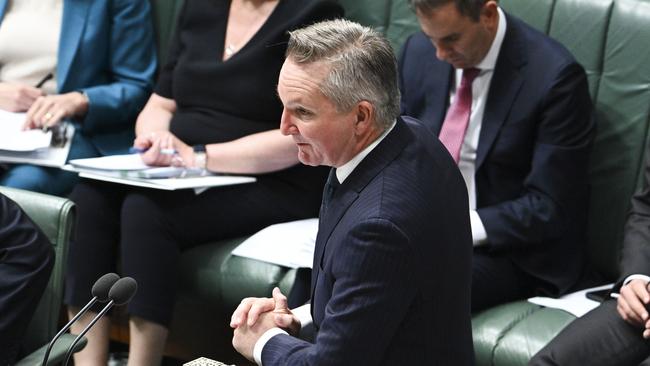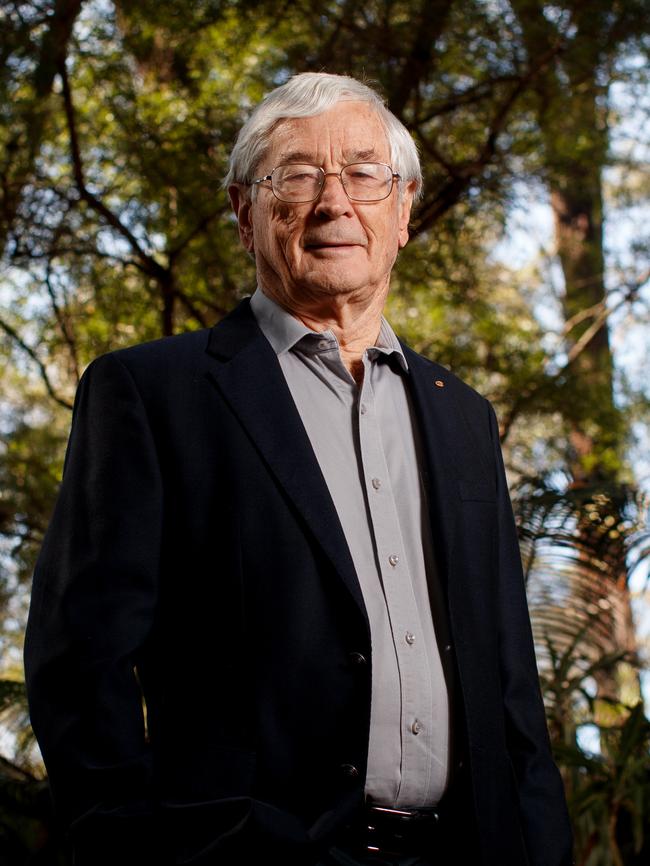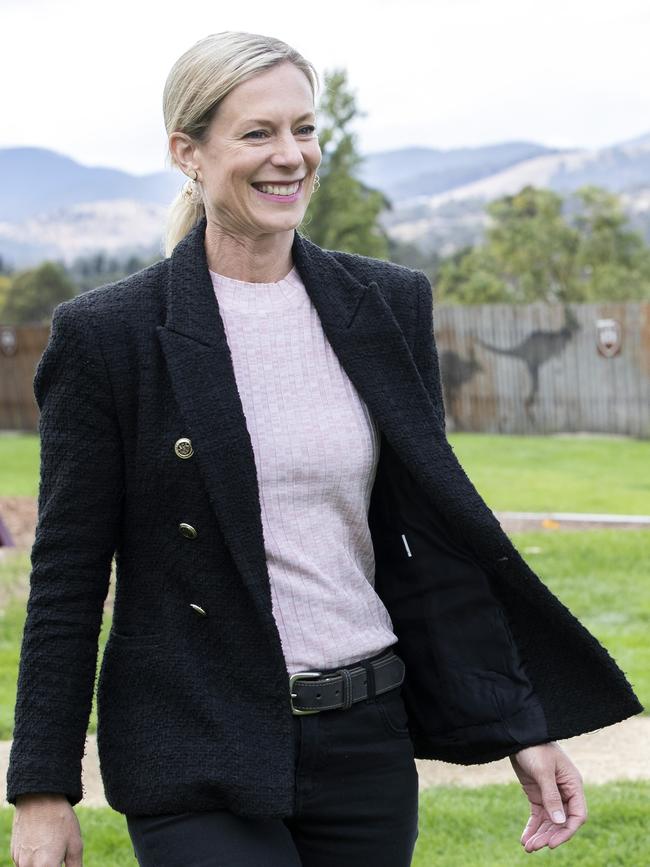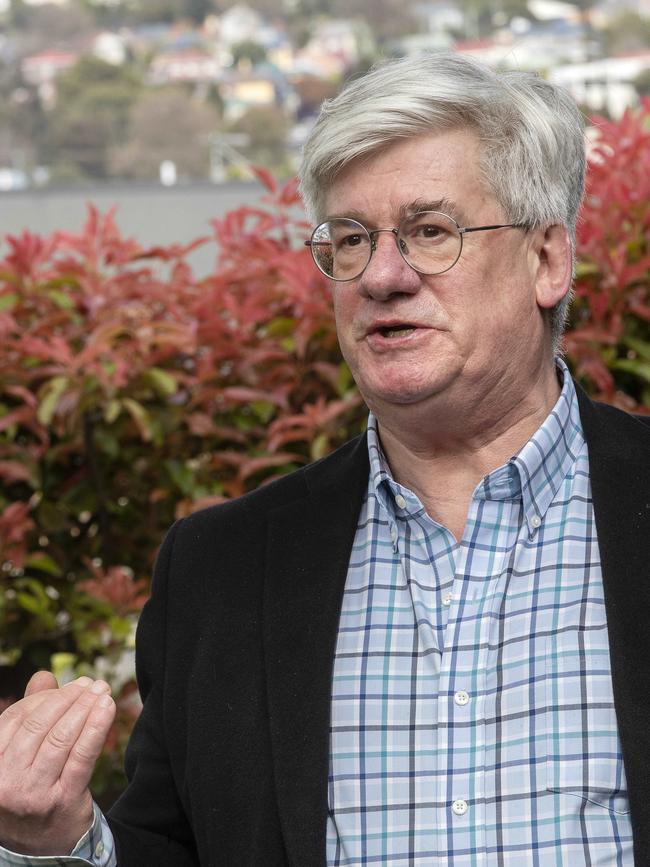
Dick Smith brushed shoulders with the truth police last week after claiming that Chris Bowen is attempting the impossible.
Smith claimed in an interview on 2GB that no country has managed to power an electricity grid solely with renewable energy. That is misinformation, according to the ABC’s Fact Checkers, who summoned Mark Z. Jacobson of Stanford University to testify on their behalf.
Professor Jacobson identified four national grids that ran on renewable energy: the Albanian Power Corporation, the Nepal Electricity Authority, the Bhutan Power Corporation and the National Electricity Administration of Paraguay. This is hardly good news for those who fear that chasing net zero will shrink our economy, since Paraguay, Albania, Nepal and Bhutan sit in the bottom half of world GDP rankings, while Australia is near the top. In 2022, the gross domestic product of the four economies combined was $US2550. Australia’s, for the record, was $US65,100.

The renewable energy exemplars do somewhat better when it comes to rain. Bhutan receives 1679mm in the average year, Nepal 1600, Albania 1485 and Paraguay 1270. The average annual rainfall across Australia is 433mm, according to the Bureau of Meteorology website. All four countries are powered entirely by hydro-electricity. This renders the ABC’s comparison spurious, except in Tasmania, Australia’s dampest, hilliest and poorest state, where the average rainfall on the west coast is almost double that of Paraguay.
Last year, Hydro Tasmania generated enough electricity to meet four-fifths of the state’s demand. The marginal cost of production is low, which would make electricity in the island state cheaper if not for the interstate agreement that obliges Tasmanians to share it with the energy mendicants in Victoria.
That could change if the next Tasmanian government sticks by its election promises. All this remains to be seen, however, as Labor leader Rebecca White conceded defeat on Sunday afternoon, and now caretaker premier Jeremy Rockliff seeks to strike a deal with the crossbench to form government. Whatever the case, both major parties pledged to curb sales of hydro-electricity to the mainland to bring down household power bills.
A hydro-reservation policy would undermine Bowen’s plans to turn Tasmania into the nation’s battery. It would also weaken the highly speculative business case for a second undersea cable to the mainland. The bi-directional Marinus Link has joined Snowy Hydro’s giant pumped hydro scheme and the VNI-West transmission line on the infamous list of energy mega-projects with inflated costs and embarrassingly protracted timelines.


The goal of making Tasmania energy self-sufficient grows more attractive as the cost of Marinus escalates. If a new Bass Strait link must be built, it could be built to handle one-way traffic in anticipation of the day when Tasmania will be able to export surplus clean energy to Victoria.
Yet economist Saul Eslake condemned the Tasmania-first energy policy last week as reckless. It would lead Tasmania down the Venezuelan path towards socialist disaster, Eslake told the Australian Financial Review. “They have crude oil coming out their ears, and, because of that, they think they can sell petrol to Venezuelans at 3.5¢ per litre,” he said.
Eslake argues that the loss of hydro-electricity export revenue will harm Tasmania’s economy and accelerate the exodus of Tasmanians to the mainland.
Yet Eslake’s argument is perverse. Reducing Tasmanian retail power prices relative to other states would help an incoming government attract new investment, particularly in the power-hungry digital economy. The energy demand for data processing and storage is driving the industry away from Silicon Valley towards countries such as Paraguay, where retail electricity is currently 8c a kWh, less than a third of the price in California and a quarter of the price in Australia.
There’s no use crying over spilt milk. Nevertheless, the doomed Gordon Dam above Franklin Dam would have put Tasmania on the Paraguayan path, minus the rampant corruption, human rights abuses and succession of military coups that have kept the landlocked South American nation from reaching its full potential.
In the early 1980s, when the Greens were chaining themselves to bulldozers in the Tasmanian forests, Paraguay was constructing the Itaipu Dam, named by the American Society of Civil Engineers as one of the seven modern wonders of the world.

It produces more than 40TWh of clean electricity annually, enough to meet the country’s demand four times over. Brazil, a joint partner in the project, takes the rest.
The Franklin Dam would have increased Tasmania’s hydro capacity to 4GW, comfortably more than the state’s current demand. Liberal premier Robin Grey won the 1982 Tasmanian election promising to build the dam, reduce electricity prices and attract jobs.
The Tasmanian government was overruled by the federal Labor government the following year in a decision later endorsed by the High Court. The rest is history: an effective moratorium on dam building has been in place for the past 40 years. Hydro-electricity’s role as the energy villain in the morality play of progressive politics is now played by coal. Hydro, along with solar, wind and biomass (or wood burning to the uninitiated) sits in the sacred ranks of renewable energy, an expression seldom heard outside of deep-green circles in the early 1980s.
The green movement, too, has shifted ground from its tree-hugging days. Its priority is no longer protecting the natural environment but saving the planet, which is an entirely different thing.
For example, new-wave eco-thought allows ministerial approval of Andrew Forrest’s Upper Burdekin wind turbine development in northern Queensland, despite an environmental report warning the development will have “unavoidable significant residual impact” on four endangered species: the Sharman’s rock-wallaby, the greater glider, the red goshawk and the koala. Even so, the chances of revisiting the Franklin project or any other hydro dam in Australia would probably be a step too far, even for a movement undisturbed by its own hypocrisy.

Which leaves a question hanging for the ABC’s Fact Checkers. Has anyone managed an emissions-free electricity grid in a developed economy without abundant hydro? Why, yes, claims the ABC’s expert witness. California, population 37 million, has been running entirely on WWS “for 10 out of the last 11 days for between 0.25 and 6 hours per day”, Professor Jacobson says.
By that logic, the ABC Fact Unit should be considered 100 per cent accurate, fair and balanced since, occasionally, it defies our expectations by getting something right. Last week it tested Bowen’s claim “that average build time of a nuclear power plant in the United States has been 19 years”.
Not true, the ABC’s experts ruled. The average construction time for all reactors built since 1950 was 8.1 years. For those built since 1970, it was 8.8 years.
We await the minister’s correction with bated breath.






